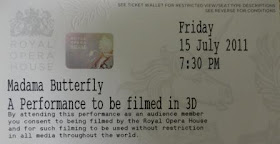De entre todas as heroínas de Puccini, Cio-Cio San (Madama Butterfly) é, talvez, a mais “sofrida”. Afronta a cultura e civilização do seu povo para casar com o americano Pinkelton, que venera e quase diviniza. Ele, sem escrúpulos, egoísta e cínico, “casa” com Butterfly mas tem sempre em mente o casamento com uma americana, o que vem a concretizar-se. A morte “japonesa” que Cio-Cio San infringe a si própria, no final, fá-la reencontrar-se com as suas origens.
Havia câmaras por todo o lado e, sobretudo, no palco.
Foram mesmo retiradas muitas cadeiras da plateia, para aí se instalar o material de filmagem mais “pesado” e sofisticado.
Enfim, uma experiência nova e interessante.
Os cantores foram os mesmos da récita que referi no texto anterior, com excepção da protagonista.
Liping Zhang soprano chinês, encarnou a Madama Butterfly. Foi uma interpretação de luxo. A sua voz é cheia e poderosa, bem timbrada, mantendo qualidade em todos os registos, sobretudo no mais agudo. Cenicamente foi muito credível e o facto de ser uma cantora oriental deu também grande credibilidade à personagem.
****
MADAMA BUTTERFLY (II) - Royal Opera House, July 2011
Among all Puccini’s heroines, Cio-Cio San (Madama Butterfly) is perhaps the most "suffered one". She dconfronts the culture and civilization of her people to marry the American Pinkelton, who she venerates almost in a divine way. He, unscrupulous, selfish and cynical, marries Butterfly but has in mind marrying an American wife, what will happen later. Cio-Cio San "Japanese" death, in the end, makes her meet again her origins.
Among all Puccini’s heroines, Cio-Cio San (Madama Butterfly) is perhaps the most "suffered one". She dconfronts the culture and civilization of her people to marry the American Pinkelton, who she venerates almost in a divine way. He, unscrupulous, selfish and cynical, marries Butterfly but has in mind marrying an American wife, what will happen later. Cio-Cio San "Japanese" death, in the end, makes her meet again her origins.
As I mentioned in the preceding text, I attended two very different performances of the opera. The present text concerns the one at a reduced price because all places were considered to have restricted visibility because it was being filmed to be broadcasted next year in 3D.
There were cameras everywhere, and especially onstage.
Many seats were even withdrawn from the auditorium to let room for the most "heavy" and sophisticated film equipments.
There were cameras everywhere, and especially onstage.
Many seats were even withdrawn from the auditorium to let room for the most "heavy" and sophisticated film equipments.
The trouble that I feared to be huge had a much smaller effect. As I was sitting in the amphitheatre that might helped minimize the negative impact because, from above, fixed cameras could be seen behind the stage. Only occasionally a cameraman went directly to the scene, but the disturbance was small.
Finally, it was a new and interesting experience.
The singers were the same of the performance I mentioned before, with the exception of the main soloist.
Finally, it was a new and interesting experience.
The singers were the same of the performance I mentioned before, with the exception of the main soloist.
Chinese soprano Liping Zhang was Madama Butterfly. She gave us a fantastic interpretation. Her voice is full and powerful, with a nice timbre, maintaining quality in all registers, especially in the top one. Artistically she was very good and being Chinese also gave great credibility to the character.
It was one more performance of superior quality at the Royal Opera House.
****


















Caro Fanático,
ResponderEliminarmuito interessante esse comentário sobre o clima e a filmagem. Acho importante acentuar que os atores cantores não se perturbaram com a interferência da parafernália de filmagem ( digo isso baseado na sua conclusão do texto ao dizer que foi um espetáculo de gala )
Um grande abraço de todo o atelier
Thanks for sharing !!
ResponderEliminarAbraço,Willy
Deve ter sido interessante o Teatro com tanto dispositivo diferente mas ainda bem que não se fez sentir a quem observava a ópera. Acha que poderemos ver esta produção a 3D no futuro na Gulbenkian? Também era giro.
ResponderEliminarAbraço.